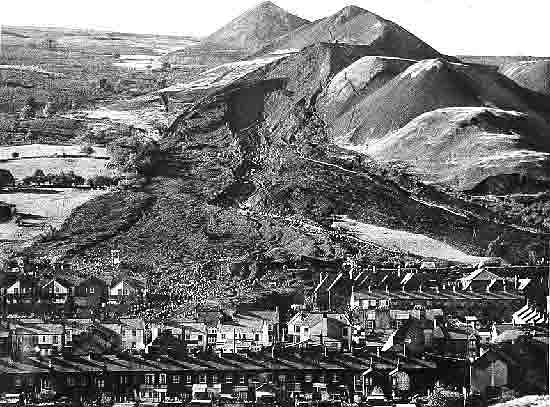

Taken from http://www.nuffield.ox.ac.uk/politics/aberfan/
At 9.15 am on Friday, October 21, 1966 a waste tip slid down a mountainside into the mining village of Aberfan, near Merthyr Tydfil in South Wales. It first destroyed a farm cottage in its path, killing all the occupants. At Pantglas Junior School, just below, the children had just returned to their classes after singing All Things Bright and Beautiful at their assembly. It was sunny on the mountain but foggy in the village, with visibility about 50 yards. The tipping gang up the mountain had seen the slide start, but could not raise the alarm because their telephone cable had been repeatedly stolen. (The Tribunal of Inquiry later established that the disaster happened so quickly that a telephone warning would not have saved lives.) Down in the village, nobody saw anything, but everybody heard the noise. Gaynor Minett, an eight-year-old at the school, remembered four years later:
It was a tremendous rumbling sound and all the school went dead. You could hear a pin drop. Everyone just froze in their seats. I just managed to get up and I reached the end of my desk when the sound got louder and nearer, until I could see the black out of the window. I can't remember any more but I woke up to find that a horrible nightmare had just begun in front of my eyes.
The slide engulfed the school and about 20 houses in the village before coming to rest. Then there was total silence. George Williams, who was trapped in the wreckage, remembered that 'In that silence you couldn't hear a bird or a child'. 144 people died in the Aberfan disaster: 116 of them were school children. About half of the children at Pantglas Junior School, and five of their teachers, were killed.
So horrifying was the disaster that everybody wanted to do something. Hundreds of people stopped what they were doing, threw a shovel in the car, and drove to Aberfan to try and help with the rescue. It was futile; the untrained rescuers merely got in the way of the trained rescue teams. Nobody was rescued alive after 11am on the day of the disaster, but it was nearly a week before all the bodies were recovered.
The last day before half-term
Some quotes taken from survivors, rescue workers and other witnesses
What I missed most was the noise and fun around the house. [My daughter] was boisterous and full of fun. Our house was as quiet as a mouse after she’d gone.
Bereaved mother
When we established the age and sex of the person they were seeking they were shown all the bodies that matched. The task was not made easier by the fact that most of the boys wore grey short trousers and the girls a standard dress and cardigan.
Policeman working at the mortuary
In the night we had to go to see if we could identify her in this chapel. I’ve never forgotten that. It comes back to me everyday. There’s some part of the day that that picture comes back to me and I can never forget that. … All these little bodies wrapped in blankets.
Bereaved father
I kept asking myself why I hadn’t died and I blamed myself for allowing my brother and sister to die.
Pupil, Pantglas Junior School
For some years I was aware of a Minney connection to the tragic Aberfan disaster. In some online archive material relating to the Aberfan Disaster there was a reference to Mr R M Minney,miner & parent of victims.
The Memorial Garden is on the school site and the graves at the local cemetery. I do not know this Minney family and for obvious reasons have never tried to contact them.
Aberfan August 2006
Additional contemporary photos from the website of Alan George